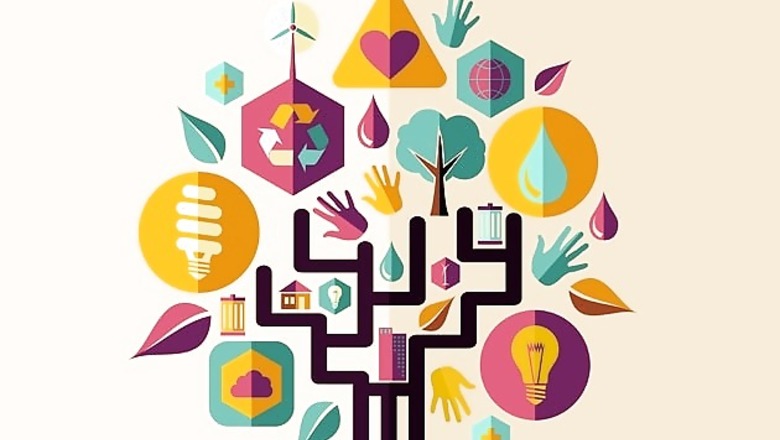
views
A little over ten years ago, a much-publicized report called Up in Smoke? was published about how the impacts of climate change could threaten to undo many of the efforts needed to achieve the Millennium Development Goals (MDGs). The report noted that climate change is undermining and damaging the food and water supply, public health, and people's livelihoods. The authors called for "a truly global solution to stop dangerous climate change" through "new models of development" and a steady stream of financial assistance to developing countries.
The MDGs were to be achieved by 2015, and much progress has been made on many of them, while we have fallen far short on others. This year the international community will meet to develop a new set of goals, the Sustainable Development Goals (SDGs). Many of the proposed SDGs are similar to the MDGs but with more emphasis on sustainable development, technological innovation, and clean energy for all, and, of course, a specific goal to combat climate change itself. Indeed, the SDGs and their relation to climate change is the topic of the upcoming 15th Delhi Sustainable Development Summit held on February 5 to 7 in New Delhi.
The good news is that since the publication of Up in Smoke, many of the items the report deemed essential to tackle such lofty goals have emerged, namely feasible new models of economic development, such as green growth, and the availability of adequate financial resources (in theory) for developing countries to transition to sustainable economies. However, what I fear may serve to undermine the realization of the SDGs is not the lack of resources, technology, or feasible economic models, but rather the lack of political will necessary to achieve these goals.
Let's take for example one of the proposed SDGs: Ensure access to affordable, reliable, sustainable, and modern energy for all. The achievement of this goal is absolutely necessary for economies to continue to grow and lift people out of poverty, while still halting the march of climate change. It is also entirely achievable, given existing technologies and available funding.
We already know that, in many instances, renewable energy is now the cheapest option available and it is continuing to get cheaper, particularly if one factors in the true cost of fossil fuels. More importantly, according to a recent Bloomberg report, "small-scale renewables offer the most efficient way to provide energy access to vast numbers of people living without power."
So here we have a clear case of an achievable, affordable, and feasible goal. Will it get done? On the one hand, there is reason to be optimistic. The Bloomberg report notes that in 55 emerging countries clean energy capacity is growing faster than in developed countries. Furthermore, finance, usually the main hurdle, is not necessarily a hindrance to achieving this goal or other SDGs. A 2011 UNDP report notes that the "global capital markets... have the size and depth to step up to the investment challenge."
There is, on the other hand, reason to be wary as well. The main obstacles preventing the flow of climate finance to developing countries are government readiness and lack of an environment that minimizes risks for investors, since most of the money will have to come from the private sector. In developed countries, there is a growing but still inadequate recognition that new energy investments should be in renewables. There is ample opportunity to incentivise these investments due to ageing energy grids and other infrastructure that require new investment. However fossil fuel subsidies and other political factors are preventing, aside from in a select group of developed countries, the fully committed leap to clean energy.
Overcoming these obstacles requires political will. It requires governments in developing countries to have the will to make significant institutional changes to demonstrate to the private sector that green investments will be as low-risk as possible. It requires political will for governments in developed countries to break free from the oftentimes powerful influence of fossil fuel interests and commit to rather large upfront costs for clean energy projects. And, unfortunately, the available evidence suggests there is not yet sufficient political will to do these things.
There are green shoots, however. An increasing number of developing countries are displaying strong commitment to developing in a sustainable way. For example, Ethiopia, with support from the Global Green Growth Institute, has developed and adopted a national policy framework aimed at growing its economy to middle income status by 2025 through environmentally sustainable economic policies. Currently, 95% of power in Ethiopia is generated by renewables and the plan is to continue to grow its already rapidly expanding economy with clean energy. Similarly, a number of developed countries are taking serious steps to adopt low carbon growth policies, such as Germany, whose government has committed to having 80 percent of its energy use come from renewables.
Ultimately, though, ensuring there is broad enough and strong enough political will to accomplish this and other SDGs must come from a groundswell of public action and opinion. This is where the concerted efforts of individuals and institutions committed to sustainable development are at their most valuable. Outreach and educational initiatives are among the most powerful tools in shifting public opinion to pressure policymakers to summon the political will and courage to achieve these goals.
(Yvo de Boer is director-general, Global Green Growth Institute)




















Comments
0 comment